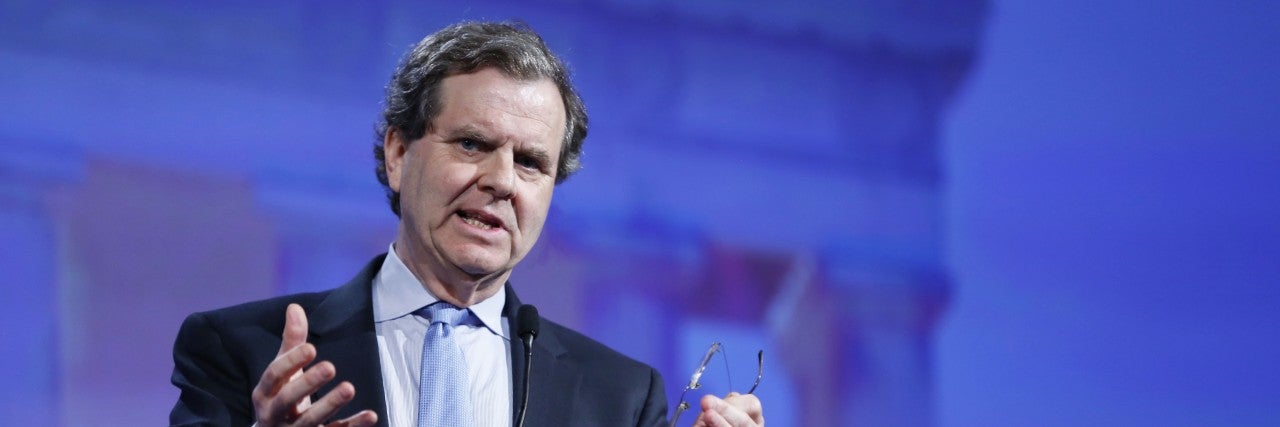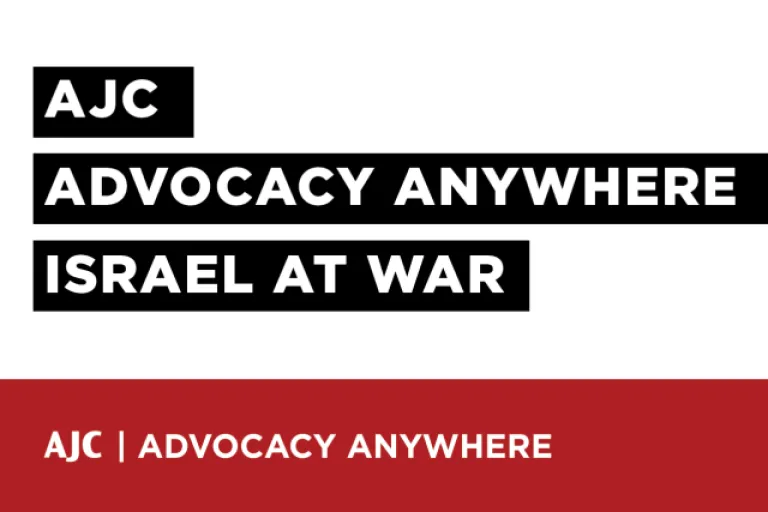August 20, 2021 — Rome, Italy
This piece originally appeared in Italian in La Voce Repubblicana.
By Amy K. Rosenthal
David Harris has led American Jewish Committee (AJC) as Chief Executive Officer for the past 31 years. Under his leadership, the international advocacy organization has strived to influence public opinion and policy on issues of utmost importance to the Jewish people, such as combating antisemitism, along with all forms of hate, as well as strengthening Israel’s diplomatic standing in the world and defending democratic values worldwide.
In this exclusive interview with La Voce Repubblicana (online daily newspaper in Italy), Harris, who recently announced he soon would step down from the helm of AJC, shares his thoughts and reflections on a host of matters such as fighting global antisemitism and the misconceptions that persist toward Israel and the Israeli-Palestinian conflict, as well as the fundamental importance of transatlantic relations in addressing the foremost challenges facing the Middle East today. On a personal and candid note, he speaks of his special relationship with Italy and reveals his intricate understanding of the peninsula.
Known for his common-sense approach and razor-sharp mind, it’s no mystery why the late Israeli President Shimon Peres referred to Harris as the “foreign minister of the Jewish people.” Yet beyond Peres’s comment, this interview also reveals why Harris serves as a towering example to anyone today who wholeheartedly seeks “to live a life of purpose.”
You have devoted your life to fighting for freedom and equality not only for Jews, but also for all minorities. That said I would like to begin by asking what led to and lies at the heart of your steadfast commitment?
First, I have always taken very much to heart the fundamental Jewish teaching that all humans are created in God’s image. For me, this has been the animating principle in the quest for human equality and justice. And second, coming from a family that were the targets of death threats for the simple reason that they were Jews, I can easily understand the slippery slope of man’s inhumanity to man, which may begin with a particular group, such as the Jews, but, ultimately aims to divide rather than unite our world. I want to be among the uniters, not the dividers.
Many Italians aren’t aware of you and your family’s personal relationship with Italy. Could you tell our readers about your special connection with il bel paese?
True. My late, Hungarian-born father was in the legendary Battle of Monte Cassino during the war, learned Italian along the way, and always felt a special bond with Italy. Moreover, in 1975, I moved to Italy, which, together with Austria, served as a hospitable transit point for hundreds of thousands of Jewish refugees from behind the Iron Curtain. I spent two years in Rome, fell in love with the country, and learned the language. And third, during those two years, I met my future wife, Giulietta, who, together with her family, arrived in Italy in 1967 as Jewish refugees from Libya and settled there, always feeling bonds of gratitude and love for their adopted country. Today, I am not only the husband of an Italian citizen, but also the father of three Italian citizens, which is a special source of pride.
In your opinion, is Italy today still a strong transatlantic ally, and moreover, a friend of Israel? In addition, what do you currently consider the foremost challenges Italy faces vis-à-vis both?
From an American perspective, Italy continues to be an anchor of the transatlantic partnership. That’s expressed in so many ways it would be hard to enumerate them in this small space. Also, from Israel’s vantage point, Italy is an important bilateral friend and partner, with cooperation extending in many directions. Challenges? I believe the broader challenge facing Europe, including Italy, and the United States is to ensure that we remain on the same page when it comes to major strategic challenges facing us all, including both aggressive nations like China and Russia and overarching threats like climate change and pandemics. In the case of Israel, it’s translating the intense warmth of bilateral ties into a stronger Italian voice in multilateral settings when Israel-related issues arise.
If you had a magic wand and could miraculously change any aspect of Italy’s relationship with Israel and/or Jews, what would it be?
No doubt, it would be to see Italy speak up more clearly and forcefully when the 27 members of the European Union meet in Brussels to discuss Israel, or when United Nations bodies gather, whether in New York, Geneva, or elsewhere, and debate one-sided resolutions against Israel. In such situations, Italy’s consistent support and leadership would be most welcome.
What is the foremost misconception about Israel that you frequently hear and would like to debunk once and for all?
The notion that Israel somehow does not seek peace, or is not willing to take major risks in the pursuit of peace, is for me the most outrageous misconception about Israel. For Jews historically, the search for lasting peace has been at the center of our journey and the foundation of our faith. Plus, as a practical matter, the idea that Jews would gather in Israel, having survived the Holocaust, expulsions from Arab countries, or communism’s Sword of Damocles, in order to live in permanent conflict with its neighbors is beyond incomprehensible. Israelis desperately want peace, enduring peace. Nothing could be more important to them.
AJC is calling for countries to not attend the UN’s forthcoming 20th anniversary of the 2001 Durban World Conference Against Racism. What would you say to European countries like Italy who have still not opted to skip Durban 20 in order to convince them to do so?
There is still time, especially since the Durban conference has been postponed from September until October. It’s not too late to join Austria, Britain, Czech Republic, France, Germany, Hungary, and the Netherlands, which are the European nations that have so far announced their unwillingness to participate in the commemoration of an antisemitic, anti-Israel hatefest. I hope Italy will soon join this group.
Unfortunately, antisemitism is on the rise worldwide. According to you, why is this occurring and what are the factors triggering it? More importantly, what is AJC's plan to effectively combat this increasingly worrisome phenomenon?
Antisemitism is perhaps the world’s oldest social pathology. Its resilience and ability to endure and manifest itself in both old and new forms is beyond shocking. Our hope was that after the Second World War and the revelations of the Holocaust including, specifically, the tragic fate of 6 million Jewish women, men, and children, we would have finally brought the world to its senses. For a while, certainly in Western countries, that seemed to be the case. But now, with the Holocaust rapidly receding in memory, with survivors and liberators declining in number, and with many antisemites trying to masquerade their hatred by focusing on Israel rather than individual Jews, we see a resurgence of the danger. That danger is made still greater by the power of social media to serve both as a launching pad and a facilitator of every vile form of antisemitism known to humankind. The basic response, American Jewish Committee believes, must come on two levels—from governments and from civil societies. Antisemitism must never be seen as a uniquely Jewish problem affecting only Jews and requiring a uniquely Jewish solution. No, antisemitism threatens all liberal democratic societies, and, therefore, needs society-wide strategies. Governments that ignore or minimize the problems, or civil societies that are missing in action or only pay lip service, will only make a bad problem worse. Conversely, governments that are laser-focused over the long-term, and civil societies that promote an arm-in-arm approach of standing together as one, have a much greater chance of success.
Historically, American Jews have voted overwhelmingly for the Democratic Party. However, today we are seeing the rise of an admittedly small but nonetheless vocal radical left-wing inside the party who have expressed not only hostility toward Israel, but also overtly biased positions regarding the Palestinian-Israeli conflict. In your opinion, is this rift inside the Democratic Party causing a shift in opinion among American Jews?
It’s important to stress that American Jewish Committee is a strictly nonpartisan organization. We don’t support political parties or candidates. That said, there are threats today both within the radical left wing of the Democratic Party and the radical right wing of the Republican Party, and both sets of threats need to be taken seriously. Traditionally, as you noted, Jews have tended to vote overwhelmingly Democratic, with the one notable exception of 1980, when, for the first time in modern history, the Democratic candidate, Jimmy Carter, received less than 50% of the Jewish vote. How Jews vote going forward will to some significant degree depend on how the leaders of both political parties position themselves. Will they reject the radical forces within their respective parties, or will they give them a wink and a nod? Many of us will be watching closely.
Is the idea of a two-state solution for Israel and Palestine still viable? What advice, if any, would you offer to both sides?
I want to believe that the answer is yes, though I’m under no illusion how difficult the path continues to be. But let’s be clear, and these are not simply talking points but documented historical facts: Beginning in 1947, and on many occasions since, the Palestinian leadership has been offered a viable two-state solution. In each and every case, they have rejected the offer. By the way, I would add that until 1967, the West Bank, Gaza Strip, and eastern Jerusalem were all in Arab, not Israeli hands, so a Palestinian state could have been formed at any moment. It wasn’t. Instead, Jordan annexed the West Bank and Egypt imposed military rule on Gaza. If enlightened Palestinian leadership emerges, sincerely committed to the search for a two-state accord, notwithstanding growing Israeli skepticism over the past 20 years, I believe that a clear majority of Israelis would welcome such a development and seek a deal. Again, the name of the game for Israelis is peace, but peace that is not an illusion but rather a pulsating reality.
We are on the eve of the first anniversary of the signing of the Abraham Accords. What in your opinion is the significance of these normalization agreements not only for Israel, but also in relation to the balance of power in the Middle East overall?
It’s a game changer, and the Trump administration deserves credit for having achieved four normalization deals with Arab countries in such a short time span. Israel is now at peace with a total of six Arab nations, while a few others are eyeing the process with greater interest and are engaging in below-the-radar engagement with Jerusalem. So, I think the possibility for further expansion is real. Obviously, the more the circle of peace widens, the greater the chances for prosperity, coexistence, and regional cooperation. That’s a strong antidote to the ongoing threats of radicalism and extremism posed by the anti-peace bloc, led by Iran, and including both state and non-state actors supported by Tehran.
Iran, along with its proxies Hamas and Hezbollah, pose a serious threat to Israel, its neighbors in the region, and moreover, the world. What policies therefore should the free world adopt vis-à-vis the Islamic Republic of Iran in order to thwart its state sponsorship of terrorism and nuclear program in your opinion?
The great danger is to underestimate the revolutionary nature of the Iranian regime, or to somehow believe that traditional means of diplomacy, such as engagement, dialogue, and rationality, will have any serious impact on the outlook of Iran’s current leaders. They are on a mission and that should be abundantly clear to every European nation. They are testing the will and the spine of our countries and, rightly or wrongly, they are finding us rather weak, divided, and naive. Collectively, we must prove them wrong, though that’s obviously easier said than done.
Two other global players, Russia and China, have been increasingly meddling in the Middle East while the U.S. simultaneously seems to be disengaging. What would you say to the Biden Administration in order to convince it to remain in the region?
A great global power like the United States may think that it can leave the Middle East, but history has amply shown that the Middle East will not leave the United States. So, we have little choice but to maintain engagement with the region, and, most importantly, strong support for our closest and most reliable allies. The Middle East is not easily secluded from the rest of the world. To the contrary, it is at the crossroads of any global map. It’s where regional and global interests converge and collide. It’s where great powers parry and lunge. The price of neglect, much more withdrawal, could end up being even higher than the price of targeted engagement.
Currently the U.S. and Europe both appear unwilling to commit themselves to the security of the Middle East. You are known for your strong stance in favor of the transatlantic partnership. Is the latter becoming solely a pipe dream or is it still a viable prospect today?
If it’s a pipe dream, we’re all in big trouble. The major challenges facing the world, whether in the Middle East or elsewhere, are unlikely to be solved by any one power, be it the United States or the European Union. Indeed, if there are any solutions at all, whatever the issue may be—from terrorism to cybersecurity, from climate change to nuclear proliferation, from inequality to public health—the best chance we have is working in the closest possible partnership, exactly as we have done since the extraordinary years of the postwar Truman administration. Of course, there will be differences du jour. That’s normal, even among the best of friends. But they should never be allowed to overshadow the shared values and interests that are at the heart of the transatlantic alliance, which is exactly where they must remain.
You have recently announced your forthcoming stepping down as CEO of American Jewish Committee. What do you view as your foremost achievements at the helm of AJC? Moreover, how do you hope your legacy will be characterized?
As I have never looked forward to stepping down from what has for me been a dream job, this isn’t a question I’ve given a lot of thought to, so let me simply share two thoughts for now. First, I approached my life and my career as a proud Jew who, against the backdrop of the tragedies that had befallen my parents, my wife, and other Jews, sought to help write a bright and promising new chapter for the Jewish people, including the State of Israel. And second, as a proud American, blessed to have been born in a land of freedom and opportunity, I wanted to devote myself to defending democracy and freedom against the ever present threats of totalitarianism on the left and fascism on the right. I’ve come to understand that, on both fronts, there’s no Pfizer or Moderna vaccine that can cure all the ills of our world. But, at the very least, I wanted to answer the perpetual question "What’s the purpose of life?" by trying to live a life of purpose.


